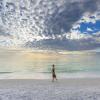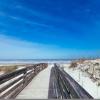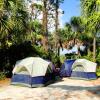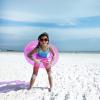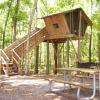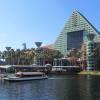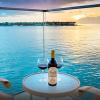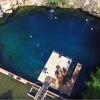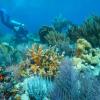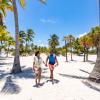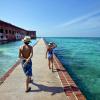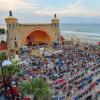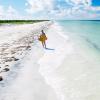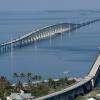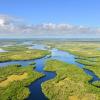Here's some helpful information about where, when and how to camp out in the Sunshine State.
The smell of wood-smoke filled my nose as I basked in the warm glow of the campfire. Under twinkling stars in the deep-blue night sky, my family and I relaxed in the serenity of peaceful waters under a palm-tree canopy. Skewering another marshmallow onto a stick, I happily toasted it for the next delicious s’more.
Camping provides a great way to bring the family together and to appreciate Florida’s natural beauty. From northern springs to coral reefs, beaches to subtropical forests, a wide variety of camping adventures awaits those that set out to find them.
Florida offers camping in national parks and forests, state parks and recreational areas, county and city parks, as well as private campgrounds. The right campground provides a home base for outdoor enthusiasts – from active sports such as hiking and biking to more relaxing pursuits, such as fishing and boating. It’s important to find out what amenities and activities your choice of campground provides. Here are some more camping tricks and tips to follow in Florida.
Home Away From Home
Of course, tents are the least expensive shelter. You can store one in your closet with your sleeping bags. If you want to hike five miles to a primitive campsite, you can do so with your tent. Your tent should have screen windows on more than one side to allow breezes to blow through. This helps air out the tent and in Florida you'll likely want that breeze on most days. If not, you can always zip the flaps over the screens. Other features – how easy it is to put up and take down, how much it weighs, how many people it sleeps – are just a matter of personal taste and budget.
For others, RVs are the only way to go. Fuel up and there's nowhere you can't travel to. It's like an apartment on wheels. An RV can be quite expensive, so do your research and talk to several dealers before buying one. If an occasional trip is all you're interested in, consider renting one from RV America. When camping, you'll typically pay more than tent campers to park your RV at a campground. (For information on RV campsites in Florida, check out Camp Florida.)
Campers fall somewhere in between – they provide more solid shelter than tents and provide many of the comforts of home. Campers are also more compact than RVs, but you can’t drive them, so they have to be towed.
When choosing your perfect destination, make sure that your particular mode of shelter is allowed. Approximately one-half of all of the campgrounds in Florida prohibit tent campers. Other campgrounds do not have RV accessibility and furthermore, some of the campgrounds, such as Cayo Costa State Park, are only accessible by boat.
Still other parks have primitive sites that campers must hike to. Primitive camping means no flush toilets and no hot showers. More than likely, you will have to also bring your own water to a back-country camp site as well. Taking the time to plan ahead will help your camping trip be enjoyable and memorable.
Make sure that the park has no age restrictions. In many of Florida’s private RV parks, children are not welcome, and even if you are an adult, some parks have a rule that at least one camper must be over the age of 55.
Many campsites come with water and electricity outlets, and some don't. Even if you're tent camping, you may want these features. It's a good idea to ask if these are available and, if you're in an RV, if there's a dump station.

Weather or Not
Many people visit and live in Florida because of the weather. But the weather is a major consideration when beach camping in Florida. There are two main seasons in Florida: the dry season and the wet season.
Winter brings Florida the dry season and mild, sunny days that are perfect for being outdoors. There are few days when rain and cool temperatures are in the forecast. However, you should still be prepared. Between December and May, make sure you have warm clothing and a blanket when camping. It can be in the 80s in the daytime and dip into the 30s at night in the winter (with northern Florida sometimes getting even colder), so packing a range of clothing is the best way to prepare.
The wet season rarely sees temperatures under 80 and with the heat index, the temperature and humidity can feel as though the temperature is more than 100. Rain is common in the afternoon, and sometimes it rains all day. If you plan to camp during the wet season, always be aware of the forecast and be prepared to get wet. This hot, wet weather can bring out mosquitoes and other insects that can make the outdoors unpleasant.
Do’s and Don’ts
Follow any rules your campground has. Some rules may include the prohibition of pets and alcohol, observed quiet times at night and guidelines for campfires.
The outdoors is open for everyone to enjoy. When camping, the outdoors is even more open with regard to privacy because privacy barriers you have at home may not exist. Being mindful of others is simple etiquette. Set up in an area and in a way that does not encroach on other campsites or campers’ privacy. Respect “quiet time,” usually after 9 p.m.
It's also common sense to clean up after yourself before you leave your campsite. Don't leave trash that can ruin the site for not only the next camper, but for the wildlife who may visit. Even if it's a gum wrapper or a cigarette butt, please dispose of it properly.
Don't feed any wildlife, especially if they seem to be asking for a handout. It's dangerous for wild animals to associate people with food because they can become aggressive. When that happens, wildlife managers often have no choice but to kill the animals. This is one of the most important camping tricks and tips you can follow.
No matter where you are camping, whether in the wild, miles from civilization, or at an improved campground, find out in advance if reservations or special permits are needed or if open fires are allowed.
When building a campfire, the smaller the fire, the easier it is to contain. If a fire pit is not available, make one. Make sure the campfire is a safe distance from tents, dry grass, overhanging branches, vehicles and airboats, and never leave the campfire unattended. Also ensure that any camp stoves and fuel bottles are several feet away. Clear any debris in a 10-foot radius around the campfire. Always keep a good supply of water nearby to douse the fire in case the fire gets out of control.
Assume that all wilderness streams and creeks are potentially contaminated water sources due to domestic and wild animals and bring bottled water. Plan your meals according to how many days you will be on a trip, and then bring extra food. When you are exercising throughout the day, you need a high-caloric intake. Portable foods, such as granola bars, packaged trail mix and peanut butter are excellent choices. You can even purchase dehydrated meals that only require the addition of water.
It is best to leave foraging for berries to the animals, because it is easy to mistake toxic berries for edible ones that can make someone sick and ruin the entire trip. If you are in an area where fishing or hunting is possible, you have even more potential for a varied diet. Plan every meal, including snacks, in advance. Keep the campsite free of food odors and do not bring food into tents. Pack food in re-sealable plastic bags or containers.
Don’t skimp on the cost of your first-aid kit, as it may mean the difference between life and death. A comprehensive kit will include all that’s commonly needed for initial medical attention. Include antihistamines such as Benadryl. Taken by mouth, they are effective for allergic reactions or rashes from poison ivy to mosquito bites and bee stings. Check your kit before each trip to make sure everything is there.
Bring citronella-based products to repel insects and put it on clothing instead of skin whenever possible. Spray repellents can also be used.
It is safest to camp with at least one companion. If you will be entering a remote area, your group should have a minimum of four people.
Leave your plans with a responsible person. Include such details as the make, year and license plate number of your car, the equipment you’re bringing, who else is going and when you plan to return. Provide any contact numbers, such as your cell phone or campground number.
Whether you are highly experienced, or a novice who needs a camping guide, camping can be as comfortable as it is enjoyable. Add to that the fact that it offers the ideal escape from the headaches of our fast-paced world, and you have more than enough reason to take to the wild.
Your Camping Checklist
Many camping checklists exist in books, magazines and on the Internet. The following list is for typical items and items that may be especially important for Florida camping:
- water
- sunscreen
- sunglasses
- hat that shields your face
- a good map
- insect repellent (not just for mosquitoes, but ticks and chiggers, too)
- flip-flops for wearing in public showers
- flashlight
- first-aid kit
- toiletries
- trash bags
- at least one extra change of clothing per day
- food and cooking equipment
- important phone numbers
- battery-operated radio
- sleeping bags
- binoculars
